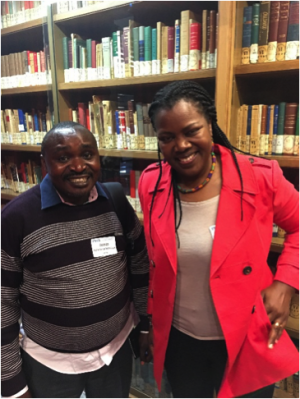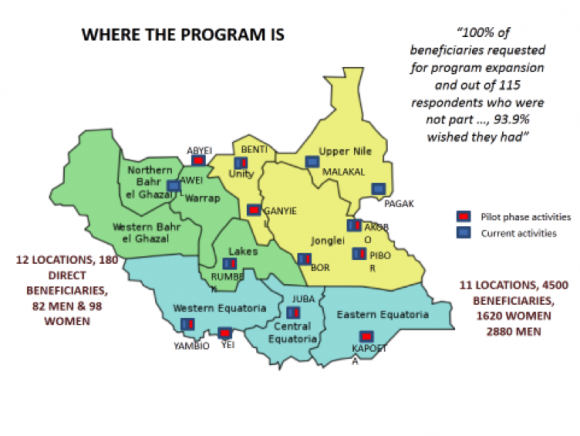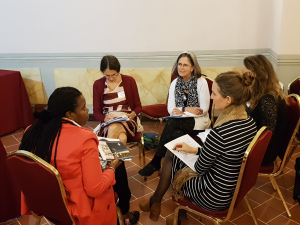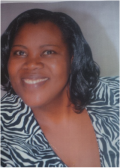My experience at the INEE PSS-SEL Round Table

In October 2017, I was invited to participate in the INEE Round Table on Psychosocial Support and Social and Emotional Learning in Florence, Italy, in order to share my work with Morning Star, a trauma awareness program being implemented in South Sudan. The round table event brought together education and psychosocial support practitioners and researchers working in the field of education in emergencies (EiE) and protracted crises. In this blog, I share briefly on the South Sudan context and discuss the contribution my program is making. I also highlight how I benefited from attending the round table event and the INEE Working Group meetings that took place in the days following the round table.
Conflict and trauma in South Sudan
Decades of conflict in South Sudan have left behind an acutely distressed society. Varying levels of stress, including trauma, deepens the personal and social cost of ongoing violence and contributes to prolonging conflict. It has been said that long term conflict can turn victims into perpetrators and undermine all dispute resolution mechanisms available to a population. Leaving ongoing cycles of violence erodes society’s potential for peace. Trauma, if left unaddressed, can result in people being alienated from one another, de-humanizing “the other” and seeing “the other” as the enemy. These issues can reverse or inhibit gains made by children and youth academically, cause health concerns, and influence a young person’s choice to continue schooling. The effects can be further exacerbated by national level conflicts such as the 2013 violence in South Sudan. The outbreak of violence in July 2016 equally played out in all regions especially the Greater Equatoria. As a result, the need for psychosocial support interventions in and around learning centers is expanding. In order to move forward as a peaceful and united country, the effects of trauma on South Sudanese society must be addressed.
Morning Star - grassroots healing
In the South Sudan context, I work as a program Director for Morning Star, a trauma awareness program implemented by AECOM under the USAID’s Viable Support to Transition and Stability (VISTAS) program. The program’s goal is to raise awareness about psychosocial distress and trauma and to bring practical tools to communities, schools and education personnel that are deeply affected by conflict. Through Morning Star, communities understand how levels of stress, including trauma perpetuates historical tensions among communities and begin bridging these divides, paving the way for reconciliation. The Morning Star curriculum is based on the Strategies of Trauma Awareness and Resilience (STAR) tool developed by Eastern Mennonite University and adapted for the South Sudanese context. The curriculum helps to prepare individuals, teachers, students and community members to understand and address the impact of trauma and make connections between, violence and reconciliation among divided youth, in school settings and communities.
At its inception, Morning Star implemented a pilot phase in diverse communities from both rural and urban settings in order to come up with a more contextualized program. A total of 180 people in eleven locations were reached. An external evaluation was conducted before, during, and after the implementation of the pilot phase to establish the program’s potential. The survey found that 100% of the direct beneficiaries and community members interviewed requested the Morning Star program be made accessible to more people in this country. Hence, the current program design is based on lessons learned from the pilot phase.

Working at the grassroots level, Morning Star engages South Sudanese communities in stress and trauma awareness activities through a team of 21 master trainers who are trained in the subject of trauma and delivery mechanisms. Depending on the specific context and audience, the program employs a portfolio basic tools: five-day tool, two-day tool, theater and radio tools, and children and youth tools. The materials consist of narratives and matching South Sudanese artwork that depict the trauma healing journey, starting from the traumatic event, reactions, impact of trauma, and the relationship between trauma and violence. The curriculum for children particularly focuses on creating environments in which children feel safe and cared for while acknowledging the harsh realities around them. Activities in the manual include learning exercises, stress relief, learning how to deal with emotions. The tools present a number of strategies to address the effects of trauma at individual and community level for healing and possible reconciliation. The tools have been used with children and youth, in varying levels of education, and also with teachers and other education personnel. Since January 2017, Morning Star has reached more than 5,000 beneficiaries among which 2,000 are women.
As was the case during the pilot phase, the Morning Star program continues to attract a lot of interest from ordinary people, leadership groups, and local and international organizations. Feedback from participants points to a great success of the program in tems of supporting emotional resilience and self-awareness among communities, including children.
Reflections on my participation in the INEE meetings
The INEE Round Table event highlighted innovations and approaches to PSS with the goal to articulate knowledge gaps and develop policy recommendations. It was evident that INEE is coordinating very important agencies across the globe that will help in realizing this goal. The inter-agency linkages between the many actors offer a solid approach to providing PSS and SEL in emergencies. My observation is that INEE would benefit even more with integrating local representatives. African countries have largely been affected by violence and the need for PSS and SEL intervention is evident. It is clear that most of the agencies present at the meeting work on the continent, however, while the attendance was diverse, only two individuals were based on the continent.
 As an honest admission, we have not been entirely successful in analyzing the impact of the Morning Star program, and we wrestle with a lot of questions related to how to be successful in an unstable environment. But at least we're not alone in this; all of the agencies participating in the INEE Round Table operate in similar environments and are struggling with the same questions.
As an honest admission, we have not been entirely successful in analyzing the impact of the Morning Star program, and we wrestle with a lot of questions related to how to be successful in an unstable environment. But at least we're not alone in this; all of the agencies participating in the INEE Round Table operate in similar environments and are struggling with the same questions.
While we know from participant feedback that the Morning Star program contributes to improved psychosocial and emotional learning and wellbeing for children in emergencies, we struggle to keep the program running in an environment where violence is rampant and support systems are not. Experience from my own program indicates that individuals and communities have the potential to thrive even when the environment is harsh, but we know we can do more. I was pleased to hear about and participate in discussions about the development of standards that can benefit programs like mine. Clearly any such standards will require flexibility and contextualization, but it was encouraging to discuss this way forward with INEE Round Table participants and INEE Working Group members. My participation in these meetings greatly enhanced networking opportunities that I'm sure will develop into collaborations to enrich our program.
Finally, I want to take this opportunity to thank INEE for the invitation to participate in the Florence events and Education Above All for providing the financial support to make this possible. I was honored to be a representative from the African continent and from a grassroots organization. I cannot over-emphasize the importance of having grassroots based people in such meetings, and I encourage INEE and its partners to ensure this happens at future events as well.
The views expressed in this blog are the author's own.
 Shiphrah A. Mutungi is a development professional with more than 20 years of experience and technical skills in conflict transformation, peace building, trauma and resilience building, and organization development processes including programs and systems development. I have developed, implemented, and managed a wide range of projects, including start up, piloting, monitoring and evaluation, sustainability, developing effective teams, and curriculum development. I have held program management and leadership positions with various organizations in East Africa. Currently supporting the implementation and development of a sustainability strategy for Morning Star, a trauma awareness program implemented by EACOM International South Sudan. I am a PhD candidate in organization development (OD) and a graduate in conflict transformation from Center for Justice and Peace Building from Eastern Mennonite University, VA USA. In addition, I hold a Master’s degree in Psychology and Bachelor’s degree in Social Sciences both from Makerere University. Other achievements include training in Trauma and Recovery from Harvard Medical School, MA USA.
Shiphrah A. Mutungi is a development professional with more than 20 years of experience and technical skills in conflict transformation, peace building, trauma and resilience building, and organization development processes including programs and systems development. I have developed, implemented, and managed a wide range of projects, including start up, piloting, monitoring and evaluation, sustainability, developing effective teams, and curriculum development. I have held program management and leadership positions with various organizations in East Africa. Currently supporting the implementation and development of a sustainability strategy for Morning Star, a trauma awareness program implemented by EACOM International South Sudan. I am a PhD candidate in organization development (OD) and a graduate in conflict transformation from Center for Justice and Peace Building from Eastern Mennonite University, VA USA. In addition, I hold a Master’s degree in Psychology and Bachelor’s degree in Social Sciences both from Makerere University. Other achievements include training in Trauma and Recovery from Harvard Medical School, MA USA.



